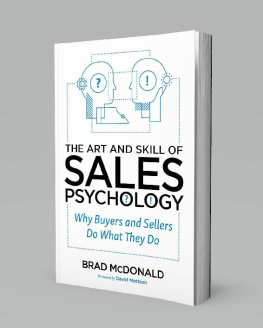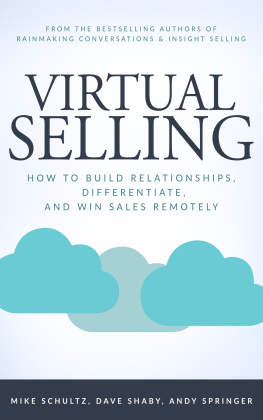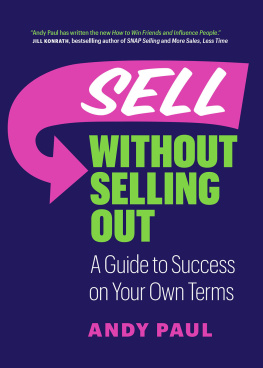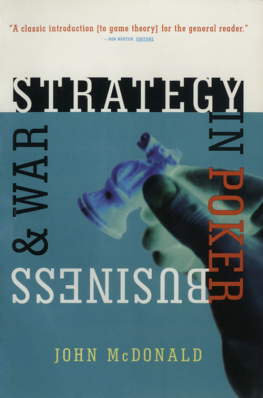Brad McDonald - The Art and Skill of Sales Psychology: Why Buyers and Sellers Do What They Do
Here you can read online Brad McDonald - The Art and Skill of Sales Psychology: Why Buyers and Sellers Do What They Do full text of the book (entire story) in english for free. Download pdf and epub, get meaning, cover and reviews about this ebook. year: 2019, publisher: Sandler Systems, Inc., genre: Romance novel. Description of the work, (preface) as well as reviews are available. Best literature library LitArk.com created for fans of good reading and offers a wide selection of genres:
Romance novel
Science fiction
Adventure
Detective
Science
History
Home and family
Prose
Art
Politics
Computer
Non-fiction
Religion
Business
Children
Humor
Choose a favorite category and find really read worthwhile books. Enjoy immersion in the world of imagination, feel the emotions of the characters or learn something new for yourself, make an fascinating discovery.
- Book:The Art and Skill of Sales Psychology: Why Buyers and Sellers Do What They Do
- Author:
- Publisher:Sandler Systems, Inc.
- Genre:
- Year:2019
- Rating:3 / 5
- Favourites:Add to favourites
- Your mark:
- 60
- 1
- 2
- 3
- 4
- 5
The Art and Skill of Sales Psychology: Why Buyers and Sellers Do What They Do: summary, description and annotation
We offer to read an annotation, description, summary or preface (depends on what the author of the book "The Art and Skill of Sales Psychology: Why Buyers and Sellers Do What They Do" wrote himself). If you haven't found the necessary information about the book — write in the comments, we will try to find it.
Brad McDonald: author's other books
Who wrote The Art and Skill of Sales Psychology: Why Buyers and Sellers Do What They Do? Find out the surname, the name of the author of the book and a list of all author's works by series.
The Art and Skill of Sales Psychology: Why Buyers and Sellers Do What They Do — read online for free the complete book (whole text) full work
Below is the text of the book, divided by pages. System saving the place of the last page read, allows you to conveniently read the book "The Art and Skill of Sales Psychology: Why Buyers and Sellers Do What They Do" online for free, without having to search again every time where you left off. Put a bookmark, and you can go to the page where you finished reading at any time.
Font size:
Interval:
Bookmark:

2019 Sandler Systems, Inc. All rights reserved.
Reproduction, modification, storage in a retrieval system or retransmission, in any form or by any means, electronic, mechanical, or otherwise, is strictly prohibited without the prior written permission of Sandler Systems, Inc.
S Sandler Training (with design), Sandler, and Sandler Selling System are registered service marks of Sandler Systems, Inc.
Paperback: 978-0-578-46727-6
E-book: 978-0-578-46728-3
To my father,
Ewing Raiford Mickey McDonald Jr.
the original Captain McDonald.
Contents

Acknowledgments

F or encouraging me to hang in there during the rough seas of my early sales days, I send special thanks to my wife Kim, as well as all our family: Tyler, Luke, Mary, Rose, Ava, Colin, Ewing, and Bailey.
Also, thanks to my mother for proofing and editing all of my articles. Thanks to my dad who always believed I could move the world with my fingertips. Im not that good, but he thought I was. Youre forever in my heart, Dad.
FOREWORD

A s I was reading Brad McDonalds fine book, I was reminded of one of the selling rules formulated by the founder of our company, David Sandler. Its one that sometimes stops people in their tracks when they hear it for the first time. The rule is: Selling is a Broadway show performed by a psychiatrist.
Many people hear that and ask themselves what the statement could possibly meanand whether its really a rule at all. Heres a brief overview of what Sandler was getting at. First, the reference to the Broadway show, which puzzles a lot of people, is meant to remind salespeople that selling is a performance. That means youre playing a role, and you know it. You might sometimes do things a little differently than you would otherwise do them based on the situation youre facing and the requirements of the role youre playing. You might on occasion act as though you dont know something that you actually do know. You might choose to speak slowly and methodically to someone who needs that kind of pacing, when your initial instinct might be to speak quickly and with enthusiasm. You understand that youre giving a performance, and you tailor that performance to the situation you face and the audience thats in front of you.
What about the performed by a psychiatrist part of this rule? What Sandler was trying to remind salespeople about is the inescapable reality that to be successful, you need to develop a deep understanding of the human dynamics that underlie any and every selling situation. You need to be able to manage your communication and your own emotions based on fundamental principles of human behaviorprinciples that many salespeople overlook or never study.
Brads book is, for salespeople, an in-depth, and long-overdue, examination of the neglected art of putting on that Broadway play and the equally neglected doing so as a psychiatristor, at least, as a layman with a basic understanding of the important psychological principles that can influence the selling cycle. The book also gives managers some important insights and strategies on understanding the human dynamics of their working relationships with the salespeople who report to them. Its an important resourceone that I think every sales professional should read.
David Mattson
President/CEO, Sandler Training
Introduction

S ales is an emotionally charged vocation. Sometimes all it takes is one unsuccessful appointment, one prospect who looked hopeful and then went dark, or one too many think-it-overs to cause a salesperson to question their choice of professionor judgment.
My own initial foray into sales, after a long, proud career in the United States Navy, had more than its share of emotional ups and downs. A little background: I followed in my fathers footsteps to become a submarine captain. I worked on five different submarines and served as commanding officer on the fifth. I was leading security operations in the Mediterranean and the Atlantic and supporting classified missions that involved a Navy SEAL team. I was in charge, and I was comfortable with that. When I said, Jump, people asked, How high? I was a valiant and brave sailor on the high seas. I faced death on a regular basis. Yet when I transitioned into civilian life and started making sales calls, I didnt feel so brave. Why was I terrified to pick up the phone and make a cold call?
I realized I had entered a whole new world. Prospects thought nothing of misleading, obfuscating, or out-and-out lying to me about their intentions. Typically, they ignored my requests or suggestions. My sales interactions often felt more like fights than mutually beneficial engagements for both parties.
My big learning point came with the discovery of Sandler Training and the help of my beloved sales mentor, Coach Jim Rohrbach. He helped me figure out that sales was as much a mind game as anything. Prospects, Jim told me, would play with my mind just as much as I let them.
Sun Tzu, an ancient-Chinese general and military strategist, said, If you know the enemy and know yourself, you need not fear the results of a hundred battles. My parallel became, If I know my prospects and know myself, I need not fear the results of a hundred sales calls.
My efforts at learning led me to sit down every Sunday afternoon for several years to write an article on what I had learned about the sales process. This book is a compilation of some of these articles. When I looked back at the collection, I realized that it is all psychology. Im no psychologist, for sure, but if I were starting in sales today, I would first run to the nearest bookstore for books on psychology and concern myself with sales tactics later.
If you are in sales and have struggled to understand the mind of your prospect; if you wonder why honest, moral, ethical people think they can lie to a salesperson and still make it to heaven; if you want to better control that sales interaction that seems to ride a fine line between trust and confusion; or if you struggle to understand your own mindset and frustrations when sellingperhaps this book will speak to you and provide an insight or two that will help you in controlling your sales calls.
To sales managers and coaches, let me suggest that the best way to help your struggling salesperson may be to help them create a better understanding of peoples fears, anxieties, and confusion about the sales processboth the sellers and the buyers. If youre willing to consider that possibility, please think of this book as a primer for exploring why people do what they do in sales situations. Understanding this is more essential than drilling your team in the right tactics. Of course, the tactics are important. Theyre the answer to the question, What do I do? But understanding the why behind that what might be the best place to start.
Most salespeople genuinely want to do good things for their prospects and clients; they also want to make a living, prosper, and eliminate the frustration of negative sales interactions. Heres to doing those good things, making a decent living, prospering, and pursuing a frustration-free sales career.
Next pageFont size:
Interval:
Bookmark:
Similar books «The Art and Skill of Sales Psychology: Why Buyers and Sellers Do What They Do»
Look at similar books to The Art and Skill of Sales Psychology: Why Buyers and Sellers Do What They Do. We have selected literature similar in name and meaning in the hope of providing readers with more options to find new, interesting, not yet read works.
Discussion, reviews of the book The Art and Skill of Sales Psychology: Why Buyers and Sellers Do What They Do and just readers' own opinions. Leave your comments, write what you think about the work, its meaning or the main characters. Specify what exactly you liked and what you didn't like, and why you think so.







